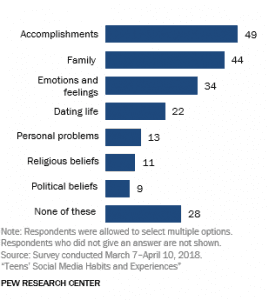The cell phone.
A device that changed the way you operate and simplified your activities but at the same time is the source of the troubles you’re having with your teenager.
They can’t get off their phones no matter what you do. They seem to enjoy being online rather than having a conversation or going out with the family.
Every so often, you regret why you bought it in the first place.
Taking it away causes more problems than letting them have it. You sometimes wonder if there’s a teen’s workshop where you can take them for an educational session on the signs of teen phone addiction.
You know your teenager might be addicted to their phone, and you wonder why? And how it happened.
Today, we’ll look at five undeniable reasons why your teenager is hooked to their phones.
Table of Content
Reason #1: The Immediate Drug-Like High it Produces
Reason #2: The Cell Phone is An Extended Self
Reason #3: The Pressure to Socialize Online
Reason #4: Teens were Born in the Cell Phone Era
Reason #5: Filling a Relational Gap
What Can I Do About My Teen Phone Addiction?
What are the Signs of Teen Phone Addiction?
Let’s dive right in.
Reason #1: The Immediate Drug-Like High it Produces

The reason drugs are addictive is partly because of the bouts of excitement it gives the users. Drugs go directly to the brain and activate the dopamine pathway.
Dopamine is a brain chemical that makes you feel good and motivates your behavior. Stimuli that play an active role in stimulating the production of dopamine include:
- Eating delicious food
- After exercising
- Good social interaction
- Sexual intercourse
- Receiving praise and positive feedback
All these activities activate the dopamine pathway in a controlled and straightforward fashion, and it lasts longer.
Drugs, on the other hand, activate this system aggressively. The high also diminish as fast as it came. A similar process occurs with teen phone addiction.
When a teenager receives a message notification on their phone, they get a rush of dopamine. The sound of the message coming in and the anticipation that it could be exciting information is enough to give them a rush of the feel-good chemical.
The teenage brain is malleable and still forming. Any behavior that is done repeatedly is deeply engraved in the teen’s brain. That’s why breaking a phone addiction is harder for a teenager than an adult.
Your teenager’s brain forms a pattern and starts to associate the cell phone with dopamine. Since the brain likes to receive quick dopamine hits, your teenager becomes dependent on the phone to make them feel good.
Any activity that doesn’t lead to an immediate rush of dopamine is abandoned for the cell phone.
Your teenager no longer sees the daily family and social activities as capable of meeting the short bouts of good feeling that the phone gives. The very reason teen phone addiction affects relationships negatively.
Reason #2: The Cell Phone is An Extended Self
The extended self consists of self plus possessions and is that part of self-identity defined by possessions, including gifts, money, body parts, monuments, and places. (Belk 1988)
The degree to which your possessions become part of your identity depends on how attached you are to them and the depth of satisfaction you believe they give you. The more attached you are to other things outside yourself, the higher your identity is placed in that item.
You guessed it, your teenager’s most prized possession that they identify with is their cell phone.
If they’ve become highly attached to it and look to it as their source of happiness, the harder it’ll be to separate them from it. That’s why any threat to take the cell phone away is met with angry outbursts and psychological challenges.
Your teenager will experience loss of self and find it hard to function because they’ve lost part of who they are. Sometimes the need to keep looking at their phone is not for pleasure but a psychological need.
Getting over a phone addiction for a teenager whose self-identity is connected to their phone is extremely difficult.
The mental disorders that studies reveal are related to cell phones and teenage addiction includes:
- Depression
- Anxiety
- Nomophobia
- Obsessive-compulsive behavior
- Suicidal ideation
Excessive use of cell phone causes these disorders. Sudden withdrawal from those who’ve become dependent on them can worsen the condition.
Before you suddenly take away your teenager’s phone, do a teen phone addiction test that can gauge whether your teenager’s phone has become a part of self and gradually wean off the phone to avoid serious psychological challenges.
Reason #3: The Pressure to Socialize Online

Teenagers generally believe that being online helps deepen their relationships with their friends. The reasons given is that socializing online helps them to:
- Connect more with what’s happening in the lives of their friends
- Display their creative side to their friends
- Feel more in touch with their friend’s feelings
- Have friends who can support them through hard times
They also believe that social media and popular teen apps have drama they wish they didn’t have to deal with. They experience negative feelings because being online also causes:
- Overwhelming feelings because of the drama they sometimes get sucked into
- Pressure to post content that makes them look good
- Pressure to post content that gets more likes and comments
- Terrible feeling about their real-life situation as opposed to those of others online
Teenagers have endless conversations online about everything. The graph below shows the commonest discussions they have.

Image source: PRC
Your teenager’s friends discuss these topics online and extend the conversation when they meet to hang out. To avoid being left out, your teen is forced to stay online, whether they want to or not.
The fear of missing out also increases the pressure to keep going online and stay up to date with what’s happening in their world.
Reason #4: Teens Were Born in the Cell Phone Era
You live in a time when most transactions and communication takes place online. You know you can’t do without the phone to carry out your daily activities. Technology has made us dependent on these devices to perform even the most basic tasks.
Your teenager was born in the cell phone era, and they can’t imagine life without it. They find it hard to understand when you tell them you grew up without a phone.
Can you blame them for coming into a world where they see the adults in their life handling their phones full time? They adopt the same behavior and beat them at their game, inevitably leading to teen phone addiction.
Teenagers not only use their cell phones for communication, but technology has helped them get:
- Improve their grades (though for others it has accomplished the opposite)
- Learn new skills
- Keep an online personal diary
- Read more books
Sometimes you may think your teen is on social media, but they could be doing constructive work using educational or creative apps. The table gives you examples of such apps.
| Positive Teen App | Function |
| Khan Academy | Free classes, exercises, educative videos, and exam printables |
| Duolingo | Teens can learn any language available in the app |
| Kindle | Contains countless books on all topics, both free and paid |
| Photomath | Your teen takes a screenshot of the difficult math equation, and they get a step by step guide on how to tackle it |
| Penzu | Your teen can keep an online personal diary, some prefer it to handwritten |
So, the next time you see your teenager on their phones, just maybe they could partly be doing positive and educative work that has been made possible with advanced technology.
Even if you choose to take away their cell phone, you know you may need to allow them access because of the changing learning methods implemented by schools.
Teach them to balance between constructive and unconstructive online presence.
Reason #5: Filling a Relational Gap

A commonsense media report revealed that 50% of teenagers admitted to cell phone addiction. They know it’s causing problems in the home and school, but they can’t stop using their cell phones.
Some teenagers knowingly or unknowingly use the phone to fill a relational need that isn’t met. Teenagers need to maintain a deep, meaningful relationship in and outside the home.
If your teenager doesn’t have good offline relationships, they’ll turn to the online platform to look for people to fill the relational gap. The two main relational gaps that can drive them online are from parents and friends.
Parental Gap
According to a Crayola experience survey, four in five parents admitted that their children had complained about not spending time with them. Parents are busy with:
- Work
- Household obligations
- Meetings
- Parties
- Devices including their cell phones
All these activities call for their attention, and they find it hard to spend time with their teenagers. They get even busier during the teenage period because they don’t want to deal with the challenges that come with adolescence.
The teenager is left at home with nothing but their phones to help them find online relationships that’ll fill the parent-teen connection they crave.
Friends Gap
A teenager may fail to make friends because they’re:
- Overly shy
- Too self-conscious
- Victim of bullying
- Missing the skills to make and keep friends
If your teenager attempts to make offline friends and is rejected, they’ll give up and go online where they don’t have to share their true selves and feelings.
Your teenager can download popular teen apps and create an avatar of who they’d like to be. They live the superhero, big-shot life online. Without intervention, they can disconnect from real life and believe their virtual personality is who they’ve become.
Such a teenager will need teen phone addiction treatment because the experience of suddenly disconnecting them from their online personality can cause serious outbursts followed by mental challenges like depression and anxiety disorders.
Helping your teenager maintain real-life relationships is a significant part of teen phone addiction treatment.
Frequently Asked Questions
What Can I Do About My Teen Phone Addiction?
Discuss with your teenager the good, the bad, and the ugly side of cell phone addiction. Help them see the need to balance their cell phone use and motivate them to have other activities and relationships offline. You can also develop strategies and consequences of not complying with the rules of cell phone use. They can also attend a teen’s workshop where they can be taught healthy and unhealthy teen habits.
What are the Signs of Teen Phone Addiction?
Uncontrolled need to look at their phone, loss of sense of time while on the phone, have arguments with others because of its use, and they experience withdrawal symptoms like anger, tension, restlessness, and irritability. A parent experiencing these challenges with their teenager needs support to help them navigate through this period. ParenTeen Kenya offers parenting classes and teen workshops to help you navigate teen phone addiction and other teen challenges.
Jane Kariuki is a devout Christian, Clinician, Psychologist, and founder of ParenTeen Kenya. She authored an exceptional training manual used in her teens’ workshop and an instructional guidebook for her parenting classes. If she is not training, blogging, or counseling, Jane loves to spend time with her sweet husband and three children.








This article is very informative. I have learned alot and I have tips to apply.
Thank you Mary, glad to be of help. many more informative articles are on the way.
Great reason learnt on this article which I will start applying.
Thank you Jane
Thank you Lucy…great to have been of help.
[…] example: If they’re spending too much time on their gadgets, telling them to put it down and study may not work because they’ll ignore your request or […]
[…] with phone addiction that encourages […]
[…] Read more about these factors in this article: 5 Undeniable Reasons For Teen Phone Addiction. […]
[…] Related: 5 Undeniable Reasons For Teen Phone Addiction […]